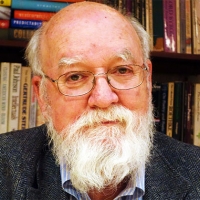DENNETT ON WIESELTIER V. PINKER IN THE NEW REPUBLIC
Let's Start With A Respect For Truth[9.10.13]
Introduction by

Introduction
"The third culture consists of those scientists and other thinkers in the empirical world who, through their work and expository writing, are taking the place of the traditional intellectual in rendering visible the deeper meanings of our lives, redefining who and what we are." (From The Emerging Third Culture", 1991)
Last month, The New Republic published Steven Pinker's article "Science Is Not The Enemy: An impassioned plea to neglected novelists, embattled professors, and tenure-less historian" (August 6, 2013). A link to a 3-minute video attacking the article was inserted in the middle of Pinker's text—"WATCH: Leon Wieseltier's rejoinder: Science doesn't have all the answers". Billed as one of "An irregular video-interview series with New Republic Literary Editor Leon Wieseltier", the video was conveniently ready for posting within minutes of the publication of Pinker's article.
Now, a month later, Wieseltier is back with a 5,650-word attack in the magazine entitled "Crimes Against Humanities: Now science wants to invade the liberal arts. Don't let it happen." (September 3, 2013).
This is not a new debate. In my 1991 essay "The Emerging Third Culture", I wrote:
In the past few years, the playing field of American intellectual life has shifted, and the traditional intellectual has become increasingly marginalized. A 1950s education in Freud, Marx, and modernism is not a sufficient qualification for a thinking person in the 1990s. Indeed, the traditional American intellectuals are, in a sense, increasingly reactionary, and quite often proudly (and perversely) ignorant of many of the truly significant intellectual accomplishments of our time. Their culture, which dismisses science, is often nonempirical. It uses its own jargon and washes its own laundry. It is chiefly characterized by comment on comments, the swelling spiral of commentary eventually reaching the point where the real world gets lost.
In 1959 C.P. Snow published a book titled The Two Cultures. On the one hand, there were the literary intellectuals; on the other, the scientists. He noted with incredulity that during the 1930s the literary intellectuals, while no one was looking, took to referring to themselves as "the intellectuals," as though there were no others. This new definition by the "men of letters" excluded scientists such as the astronomer Edwin Hubble, the mathematician John von Neumann, the cyberneticist Norbert Wiener, and the physicists Albert Einstein, Niels Bohr, and Werner Heisenberg.
How did the literary intellectuals get away with it? ...
In a second edition of "The Two Cultures", published in 1963, Snow added a new essay, "The Two Cultures: A Second Look," in which he optimistically suggested that a new culture, a "third culture," would emerge and close the communications gap between the literary intellectuals and the scientists. In Snow's third culture, the literary intellectuals would be on speaking terms with the scientists. Although I borrow Snow's phrase, it does not describe the third culture he predicted. Literary intellectuals are not communicating with scientists. Scientists are communicating directly with the general public. .../.../
No comments:
Post a Comment